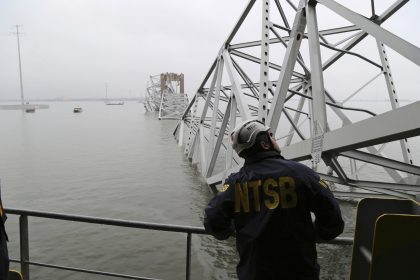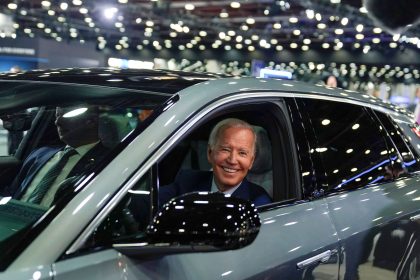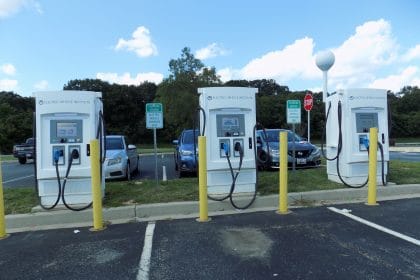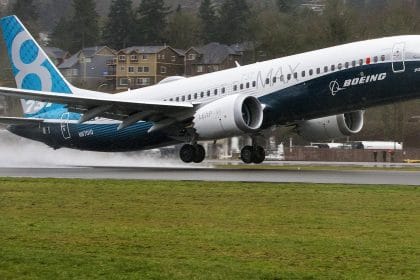In South Carolina, Governments, Employers and Schools Forge Strategy to Deal with Traffic Issues
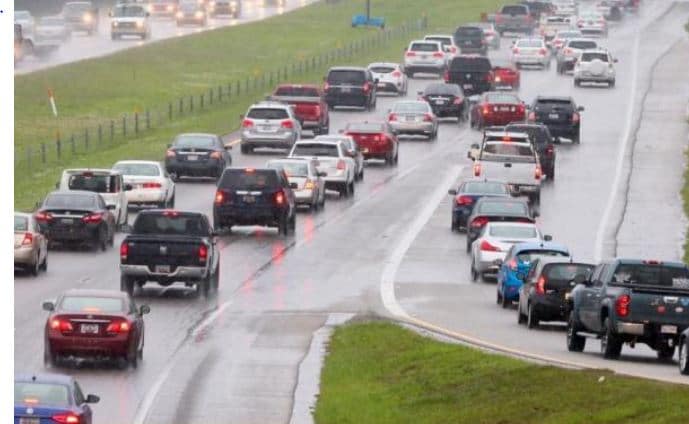
After years of economic development success, traffic congestion has become a critical challenge for the three-county region comprising the Charleston, South Carolina metropolitan area.
Every morning, hundreds of thousands of commuters head off to work on local roads ill-suited to handling such a concentrated volume, often bringing eastbound traffic on the Charleston peninsula to a near standstill between 6 and 8:30 a.m.
The situation repeats itself, in reverse, between 4:30 p.m. and 6 p.m., and heaven help anyone caught behind the accidents that can tie up major thoroughfares and side streets for hours.
In 2018, the South Carolina Department of Transportation said, 161,900 vehicles passed its traffic count station on Ashley Phosphate Road, a common commuter route known to locals as “Ashley Frustrate Road,” every single day.
Five years prior to that, the agency said, the daily traffic count at the same location had only been 129,800 vehicles, about 25 percent less or 32,100 fewer cars.
And the situation is only bound to get worse, as the population of the region is expected to grow from its current 788,000 to 1 million people in the next 10 years.
This past week, 18 local businesses with a total workforce of about 39,000, rolled out Reboot the Commute, a traffic mitigation campaign spearheaded by the Economic Leadership Council of Charleston Regional Development Alliance, a nonpartisan coalition comprised of local elected officials, and public and private sector partners.
It includes an online guide that organizations can use to implement positive changes by encouraging alternative commuting strategies like telecommuting, staggered start times, ridesharing, and connecting employees to local transit resources.
“Traffic congestion is a critical challenge affecting the quality of life and productivity of our region’s workforce,” said Anita Zucker, one of the region’s foremost business and community leaders, CEO of The InterTech Group, and Economic Leadership Council Chair.
“For decades, investments in transportation infrastructure and affordable housing near job centers haven’t kept up with the region’s steady population growth,” she continued. “If we are to create and sustain a community where people and businesses thrive for generations, where we nurture our environment, character and culture – we must invest in infrastructure and housing, and we must remake how we commute.”
As is true in most communities, the traffic ills afflicting the Charleston region today didn’t happen upon it suddenly or in an explosive manner. In fact, the roots of the traffic congestion issue in the region extend back more than a quarter century.
In 1993, Congress decided to close the Charleston Naval Base and Shipyard, a move that sent shockwaves through the surrounding communities, and left the region girding for the loss of as many as 24,000 jobs and a potential local unemployment rate of between 15 and 20 percent.
Prior to the closure being announced, Charleston had largely stayed on the sidelines of the business recruitment and development boom that was creating a “New South” with Atlanta as its focal point.
Suddenly, the community leadership — both private and public — was faced with a previously unimaginable crisis, and they quickly realized something drastic had to happen if the region was going to survive.
The question was what?
Fighting for Economic Survival
The first of a series of fateful decisions was made in 1995, when the local leaders agreed to set aside political, municipal and organizational competitiveness and form the Charleston Regional Development Alliance.
A public/private partnership, CRDA was initially funded by the governments of Charleston, Berkeley and Dorchester counties and more than 130 local companies in the belief that they’d all directly benefit from a sustainably growing economy.
David Ginn, the alliance’s longtime president and CEO, has maintained that whatever success the partnership has had, it’s grown out of “developing a strategy, forming a solid team, and recognizing that different people play different roles for the good of all.”
With the alliance in place, regional officials then hired Ross Boyle, a nationally renowned consultant and head of the Reston, Va.-based Growth Strategies Organization Inc., who produced two reports in the late 1990s showing the local economy relied too heavily on the federal government and tourism, and stressed the importance of striving for economic diversity.
Then, in 2004, the alliance hired a second firm, Austin, Texas-based consulting firm Angelou Economics to take a fresh look at the region.
Its report, “Forward Charleston,” recommended using the region’s inherent advantages – the Port of Charleston, a large pool of affordable, skilled labor, and a strong transportation and utility infrastructure among them – to build a network of complementary industry structures.
These included aerospace, the biosciences, the automotive industry, advanced security and the creative industries/tourism. The strategy has worked almost unbelievably well, with hardly a month going by without a new business opening being announced.
Over the past decade, global employers like The Boeing Company, Volvo Car USA and Mercedes-Benz Vans have built huge manufacturing facilities in the South Carolina low country, while homegrown companies like Blackbaud, Inc., a specialty computer software developer, have enjoyed ten-fold growth or better.
Each success nudged the regional population higher. The problem was, investments in regional transportation infrastructure and affordable housing near job centers didn’t keep pace, said Claire Gibbons, a spokeswoman for the alliance.
“While $6 billion in infrastructure improvements is currently underway, changing how we commute is something we can all do now,” she said. “And businesses can lead the way by offering flexibility to their employees.”
Over the course of the past year, the alliance’s Economic Leadership Council worked with public, private and academic stakeholders to understand current commuting patterns, alternative strategies for employers and employees, and the benefits – to employers, employees, the environment, and the region’s economic competitiveness – of changing greater Charleston’s commuting behaviors.
The latest American Community Survey from the U.S. Census Bureau, released in 2017, showed that 310,648 commuters in the Charleston metropolitan area drove alone in a car, truck or van to work (versus carpooling, public transportation, walking or taking some other means of transportation).
Based on other information gathered during its stakeholder meetings, the Council concluded that if just 4 percent of the region’s commuters changed their behavior during peak times, it could completely clear an entire lane of Interstate-526, the loop connecting many area communities, for all of its 19-mile length.
One Solution Doesn’t Have to Fit All
The initiative partners recognized no single solution would solve the region’s traffic congestion issues, and that some strategies rolled into the Reboot the Commute guide that grew out of the stakeholder meetings will not be viable for certain companies and occupations.
Still, said Melanie Stith, vice president of human resources for Roper St. Francis Healthcare and chair of the council’s Reboot the Commute action team, “every change – whether it’s staggered shifts, a new policy on telecommuting, changing your approach to meetings, or a companywide carpooling program – will have a significant impact” on alleviating congestion on our roads.
Paul Carff, site manager at Google South Carolina said a number of his employees have already “stepped up to make a change, incorporating compressed work weeks and telecommutes into their schedules, or adopting alternative transportation methods, like biking to work.”
Meanwhile, business organizations like the Charleston Trident Association of Realtors are increasingly harnessing technology to create flexible schedules for their employees, expanding work from home opportunities, and scheduling meetings on off-commute hours.
“We are committed to maintaining a high quality of life in our region, and being able to make a measurable impact on traffic congestion is important to me and to our organization,” said Wil Riley, CEO, Charleston Trident Association of Realtors.
And businesses haven’t been alone in making these changes.
At the Citadel, the military college of South Carolina, a number of employees now work on staggered start schedules and the institution has greatly expanded online classes for evening and graduate students.
Similar efforts have been rolled out at Charleston Southern University and the Medical University of South Carolina.
“MUSC has been an early adopter of programs and ideas that seek to alleviate traffic congestion and its various consequences in the Charleston area,” said Dr. David Cole, the medical university’s president. “Our community needs long-term multimodal transportation infrastructure solutions to create the most change. However, we also need initiatives that can start to provide relief right now.
“By encouraging our MUSC family members to implement new commute and work strategies for peak drive times, we can have a direct and immediate impact on this community problem,” Cole continued. ‘If we can work together to reboot the commute here, we can begin to reduce the stress and negative impact associated with our community’s current traffic and congestion woes.”
As for Anita Zucker, she said she and her family have been “thrilled to witness the collaboration of business leaders, government officials, and the Lowcountry’s world-class workforce in an effort to generate immediate and measurable results to the traffic congestion challenges we face.
“It is this combination of creative thinking and outstanding leadership that will continue to position the Charleston region and South Carolina as a premier destination for businesses and families,” she said.
On Tuesday, Representative Joe Cunningham, D-Charleston, told the Well News that he applauds the efforts made by the Charleston Regional Development Alliance, and specifically the Economic Leadership Council, to address the traffic congestion issue.
“It is clear that a 21st century infrastructure solution will include both investment in new infrastructure and more efficient use of existing structures,” Cunningham said. “Residents in the Charleston area have an opportunity to be a part of the solution to our traffic woes, particularly if they consider changing their commuting patterns during peak times. But Congress can and should help us improve our roads and bridges, and I am committed to advocating for a federal infrastructure package that addresses the Lowcountry’s pressing traffic needs.”


















